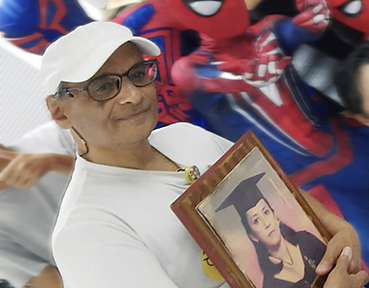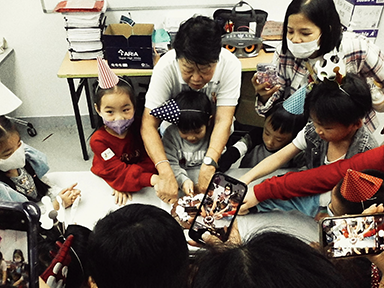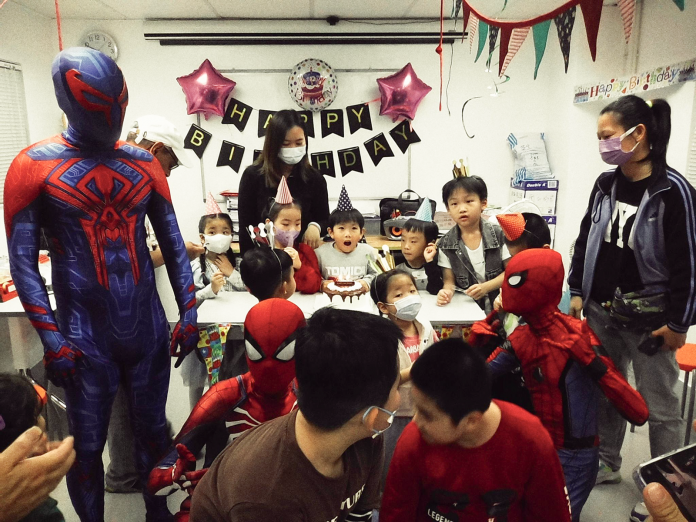NGO spreads love and blessings by holding birthday parties for underprivileged children.
By Hanne Chan
Having a birthday party is not a given for every child, and Edward Fernandes has seen many struggle to have a meal on their special days.
“I’ve seen a little boy finishing a whole plate of spaghetti within two to three seconds,” Fernandes, who founded Birthday Happiness Asia, recalls of a party hosted one and a half years ago.
“The little boy told me he did not have good food very often when he was gulping the pasta. I told him to slow down. There were lots at the party. He could take the food away with a lunchbox if he wanted to,” Fernandes adds.
Missing out on an important part of childhood, Fernandes set up the organisation with his wife Marilou Edora in 1994 to host birthday parties for the needy.
“I came from a poor single-parent family in the Philippines. My sister and I never celebrated our birthdays, neither my wife, as our parents couldn’t afford one,” he says.
The NGO nearly collapsed when Fernandes’ wife was battling cancer. The service stopped for a year until 2021, when he resurrected the service in memory of his late wife.
“My wife saw it not only as a birthday party. She tried to give them more hope and something to hang on to in the future. You just never know, maybe a joyous memory can save one’s life,” Fernandes says.

About 1.65 million people in Hong Kong – nearly one-quarter of the citizens – are living below the official poverty line, according to the latest Hong Kong Poverty Situation Report published by the government in 2020. Calculated at half of the city’s median monthly income, the poverty line stands at HK$4,400 (US $562.22) for one person and HK$20,400 (US $2606.67) for a four-person household.
Among one million children in Hong Kong, 274,900 of them live under the poverty line.
Fernandes vows he will continue his service to spread joy to needy children.
“Even in a wealthy place like Hong Kong, there are 30,000 children living in cage homes. It’s laughable – it’s not laughable, it’s very sad – I can’t do anything about it, what we can do is just spread a little birthday happiness to the children,” the founder says.
He adds: “But it doesn’t mean we give up, we carry on.”
The organisation now has about 200 volunteers organising birthday parties for grassroots children, orphans, ethnic minorities and children with Down syndrome and autism.
Volunteers host birthday parties three to four times monthly. They decorate a venue, design games, prepare gifts and food, and even bake cakes for birthday boys and girls.
Homemade cakes and nourishing food are the must-haves. “They are made with love and affection, that is the difference between bought cakes (and homemade cakes),” Fernandes says.
“Most of these children don’t eat nourishing food, and they may never taste a well-made cake again. But at least they have something to remember,” he adds.
“For the gifts, no toy promoting violence, sex or racism is allowed. This is the only guideline. Apart from that, I always let them (the team leader) take over the parties,” the founder says.

(Photo courtesy of Bianca Bernardino)
One of the team leaders, Eve Lo, is responsible for contacting social workers, gathering volunteers, and leading parties.
“Many of those kids live under tension, struggling in poverty and family problems. What I wish is that they walk away knowing that there are good spirits in society, and there are strangers who care for them,” the 67-year-old woman says.
Lo was deeply touched by the spirit of the organisation and joined one and a half years ago.
“I got to know the organisation from a news article in the South China Morning Post, and then immediately decided to apply for volunteer work. I’m not promising to change the world, but I’m happy that I gave a little happiness to someone,’ she says.
The group is working with other partnering organisations like Caritas, Sau Mau Ping Catholic Primary School, Love21, and the Society for Community Organization (SoCO) for venues and referrals of children.
Tim Tse, a social worker of the SoCO, believes such services can benefit disadvantaged children.
“The activity empowers the underprivileged group by acknowledging to them the power and rights they have. More promotion (for the NGO) is needed. The group is still unknown to many, especially those who need their service,” Tse says.
Edited by Sunnie Wu







































